Iran Being On UN Women’s Commission Is Meaningless: Malley
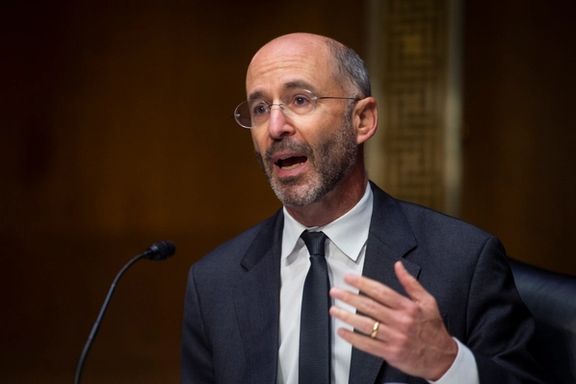
A US diplomat says it is meaningless for the Iranian regime to be a member of the UN Commission on the Status of Women while it violates women's civil rights.

A US diplomat says it is meaningless for the Iranian regime to be a member of the UN Commission on the Status of Women while it violates women's civil rights.
In an interview with MSNBC Sunday US Special Envoy for Iran Robert Malley said, “it makes no sense for Iran to be sitting on a commission whose role is to promote the rights of women when they are doing exactly the opposite.”
He said the first step by the United Nations was to create a fact-finding mission and the second move will happen on Wednesday when there will be a vote to kick Iran off the Commission on the Status of Women (CSW).
CSW is the principal global intergovernmental body exclusively dedicated to the promotion of gender equality and the empowerment of women.
Meanwhile, Iranian actress and human rights advocate Nazanin Boniadi said in a tweetthat the call to expel the Islamic Republic from the UN commission has its roots among Iran’s women’s rights defenders.
“Any effort to paint this as a Western-led effort negates their voices and is intended to prevent Islamic Republic’s expulsion,” she added.
Washington has circulated a draft resolution, seen by Reuters, that also denounces Iran's policies as “flagrantly contrary to the human rights of women and girls.”
The 54-member UN Economic and Social Council (ECOSOC) will vote on whether to oust Iran from the commission on December 14.
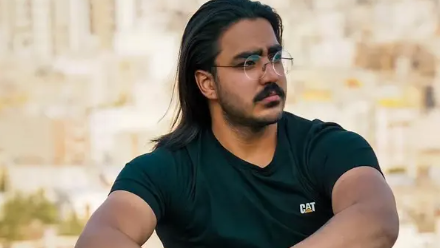
The Islamic Republic has hanged a second protester in less than a week in public on Monday after charging him with killing two members of security forces.
"Majid Reza Rahnavard was hanged in public in (the religious Shi'ite city of) Mashahd this morning ... he was sentenced to death for 'waging war against God' after stabbing to death two members of security forces," Mizan news website run by the country’s hardliner Judiciary said.
The hanging took place despite domestic and international outcry over the execution of the first protester, Mohsen Shekari, on December 8 who was charged with injuring a government security agent and blocking a street.
Both executions are seen as acts of intimidation against protesters, especially Rahnavard’s hanging in public.
Nationwide protests, in their third month, erupted after the killing of 22-year-old Kurdish Iranian woman Mahsa Amini on September 16 in the custody of morality police enforcing strict mandatory dress code laws.
The demonstrations have turned into a popular revolt by furious Iranians from all layers of society, posing one of the worst legitimacy challenges to the clerical leadership since the 1979 revolution.
The government has used thousands of well-armed regular and irregular forces to repress the protests, using severe beating, firing shotguns that have killed and blinded hundreds of people and even military weapons.
Activists on social media criticized the execution of the 23-year-old Rahnavard as "a criminal act" by the clerical establishment to deter dissent.
The United States and a host of European countries and institutions had strongly condemned the first execution. Many Iranians living in Europe demanded that the European Union and its members take tougher measures against the Islamic Republic, including severing diplomatic ties and closing embassies.
Rights groups have said Shekari was tortured and forced to confess. All tirals of detained protesters take place behind closed doors without due process, including the right of the accused to have their own defense lawyers.
Amnesty International has said Iranian authorities are seeking the death penalty for at least 21 people in what it called "sham trials designed to intimidate those participating in the popular uprising that has rocked Iran".
Iran's state media aired footage of a man, which they identified as Rahnavard, stabbing another man who fell against a parked motorcycle and then stabbing another person immediately after.
Mizan said Rahnavard was arrested when trying to flee the country 23 days ago. It added that his sentence was upheld by a higher court.
Rights group HRANA said that as of Sunday 488 protesters had been killed, including 68 minors. It said 62 members of the security forces had also been killed. As many as 18,259 protesters are believed to have been arrested, it said.
While the United Nations says the protests have cost more than 300 lives, a top Iranian state security body has said that 200 people, including members of the security forces, had died in the unrest.
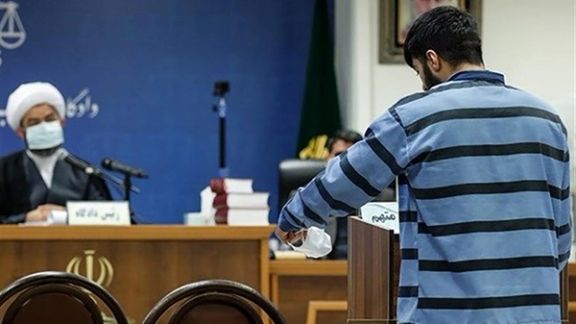
As the Islamic Republic is adamant to execute more protesters, some Islamic law experts are voicing opposition to the Judiciary’s interpretation of Sharia.
Iranian Shia theologian Morteza Moghtadaei -- the deputy chairman of Society of Seminary Teachers of Qom told Iran’s Labour News Agency Sunday that the judicial system does not adhere to Islamic law, or sharia, regarding limitation to issuing death sentence.
Himself a former Revolution Court judge and head of Supreme Court of Iran, Moghtadaei said "In cases where a person does not fight with a group and only fights with one person, that person is not called a mohareb," referring to the charge of "moharebeh" that the Islamic Republic’s judiciary has issued for many protesters.
“Moharebeh” is an Islamic-Arabic term that in the lexicon of the Iranian regime means “fighting God” and its punishment is death.
The judiciary announced on Thursday the execution of Mohsen Shekari, a twenty-three-year-old protester convicted of injuring a security guard with a knife and closing off a street in the capital Tehran. He was charged with Moharebeh that along with another Islamic concept translated as “corruption on earth” are used as broad concepts by the regime to issue maximum sentences against opponents.
Clerical judges who take orders from the hardliner Judiciary convict people to death without a real trial, often with no defense lawyers and behind closed doors. The defendants have no way of challenging state evidence or introducing witnesses.
Moghtadaei elaborated that "If a mohareb kills someone, he should get the death sentence, but if he only threatens and intimidates, even if he is convicted, he should not get a death sentence; which means although he is a mohareb but should not be executed.”
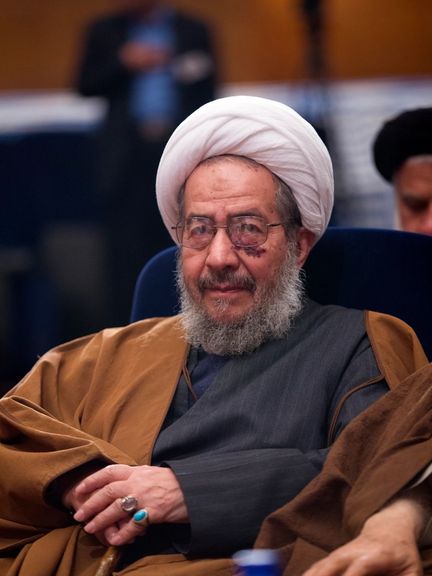
Mohammad-Ali Ayazi, another Shia scholar and a seminary teacher, also said that everyone has the right to protest and can defend himself against government agents who want to prevent him. That is not committing ‘moharebeh’, he underlined.
He added that "In an important issue such as execution, it is important that an independent lawyer defends the accused and that a public hearing is held in the presence of a jury." If these principles are not respected, the cycle of violence will continue, Ayazi noted.
Prominent Iranian lawyer Nemat Ahmadi also criticized the judiciary for the prompt decision to issue death sentences for some of the detained protesters, saying that death sentences cannot be issued so haphazardly. He said that according to Article 279 of the Islamic Penal Code, a person is called a mohareb when he takes up a weapon against the people to cause insecurity by threatening others’ lives, property and honor. “Those who oppose the government are not recognized as mohareb,” he explained.
He added that many Islamic scholars believe the term should be used to describe bandits who endanger the security of the society, considering the historic context in which the term came into existence in the first place. It is very important to determine the use of the term with a lot of caution.
Mohammad-Hossein Saket, another lawyer and law researcher, said that “in general, it is not good to mix legal issues with political issues and make hasty decisions.”
In a speech after the execution of the first protester, President Ebrahim Raisi announced that "the trial and punishment of the protesters" will continue. Also, Ahmad Khatami, a hardliner cleric and Friday prayer Imam expressed his gratitude “for the decisiveness of the Judiciary, which sent the first rioter to the gallows.” Judiciary spokesman Masoud Setayeshi had announced Tuesday that five more people indicted in the killing of a Basij militia member, Rouhollah Ajamian, were sentenced to death.
Shekari’s hanging after a hasty and unfair trial has sparked deep anger among Iranians, who believe his killing was meant to instill fear among the people, and world leaders who describe the act as the acme of atrocity and a nadir of humanity.
Iran’s top Sunni religious leader has also slammed the executions of protesters as violations of Sharia law and warned the authorities that this will not stop the antigovernment movement.
Nationwide protests that erupted after the death of 22-year-old Kurdish Iranian woman Mahsa Amini on September 16 represent one of the biggest challenges to the Islamic Republic since its establishment in 1979. So far, around 500 civilians have been killed by security forces and at least 18,000 arrested. While many have been released, around 1,500 face criminal charges, and at least 80 detainees face the death sentence.
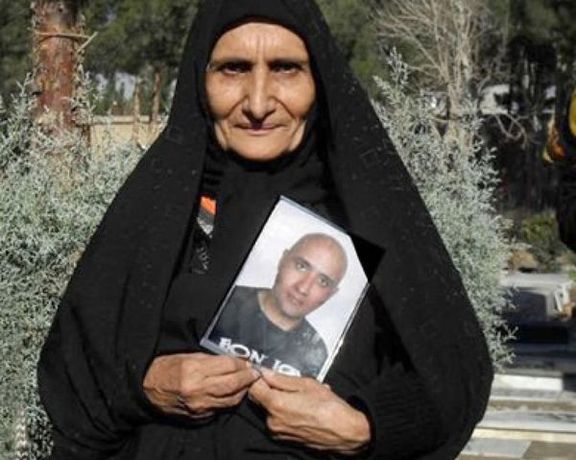
An elderly woman, whose son was killed in prison eleven years ago, says the Iranian regime has increased pressure and threats against her and her family members.
Gohar Eshghi, the mother of the 35-year-old blogger Sattar Beheshti, who was killed under torture in prison, announced in a video message Sunday that she and her family have been threatened by government agents.
Sattar Beheshti's mother emphasized that “If something happens to us, the [supreme] Leader [Ali Khamenei] is responsible.”
She added that the security forces have been threatening her for eleven years, but she and the people of Iran are ready to expel them and their master (Khamenei) from the country.
Gohar Eshghi had previously reported threats against her by the clerical regime in early December saying, “No one is afraid of death! Don't threaten!”
Last year, she was assaulted by unknown individuals when she was on her way to visit her son’s grave. Two people approached on a motorcycle and one of them attacked the elderly woman knocking her to the ground. People who saw the incident took her to a hospital, with injuries.
She has been demanding justice for her son who was arrested by security forces for his blogging activity and died a few days later, in what was believed to be a case of torture in detention.
Beheshti was an ordinary laborer who was active on Facebook and maintained a blog, often criticizing Islamic Republic officials.
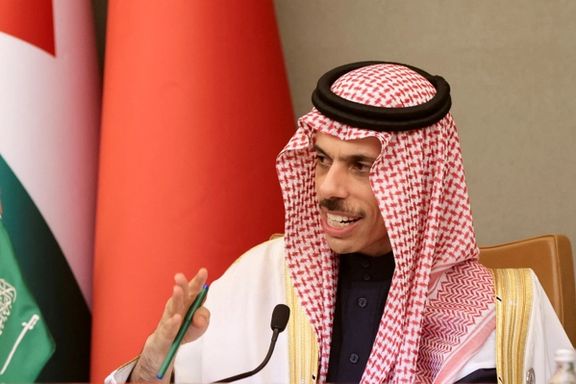
Saudi Arabia's foreign minister said Sunday that Iran's Persian Gulf Arab neighbors would act to shore up their security if Tehran were to obtain nuclear weapons.
Indirect US-Iranian talks to salvage a 2015 nuclear pact between global powers and Iran, which Washington exited in 2018, stalled in September. The UN nuclear chief has voiced concern over a recent announcement by Tehran that it was boosting enrichment capacity.
Iran reportedly has amassed enough 60-percent enriched uranium that if it decides to purify the fissile material further, it could be sufficient for at least one nuclear bomb.
"If Iran gets an operational nuclear weapon, all bets are off," Prince Faisal bin Farhan Al Saud said in an on-stage interview at the World Policy Conference in Abu Dhabi when asked about such a scenario.
"We are in a very dangerous space in the region...you can expect that regional states will certainly look towards how they can ensure their own security."
The statement came shortly after the visit of China’s President Xi Jinping to Saudi Arabia. Riyadh is seen trying to reduce its reliance on the United States. Reports last year said that Saudi Arabia appears to be building ballistic missiles with Chinese help.
The nuclear talks have stalled with Western powers accusing Iran of raising unreasonable demands, and focus shifting to the Russia-Ukraine war as well as domestic unrest in Iran over the death in custody of 22-year-old Mahsa Amini.
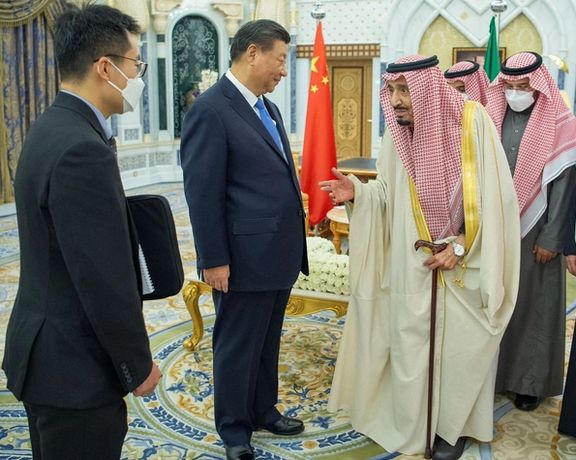
Though Riyadh remained "skeptical" about the Iran nuclear deal, Prince Faisal said it supported efforts to revive the pact "on condition that it be a starting point, not an end point" for a stronger deal with Tehran.
Sunni-ruled Gulf Arab states have pressed for a stronger agreement that addresses their concerns about Shi'ite Iran's missiles and drone program and network of regional proxies.
"The signs right now are not very positive unfortunately," Prince Faisal said.
"We hear from the Iranians that they have no interest in a nuclear weapons program, it would be very comforting to be able to believe that. We need more assurance on that level."
Iran says its nuclear technology is solely for civil purposes, but its policy of enriching uranium to 60 percent has no civilian use and only a short step away from bomb-level purity of 90 percent.
A senior Emirati official said on Saturday that there was an opportunity to revisit "the whole concept" of the nuclear pact given the current spotlight on Tehran's weapons with Western states accusing Russia of using Iranian drones to attack targets in Ukraine. Iran and Russia deny the charges.
Anwar Gargash, the diplomatic advisor to the president of the UAE, reiterated a call for "explicit" security assurances from traditional Western allies, especially in dealing with the threat from Iranian drones that Gulf states have long warned about.
It was not until these weapons "made it into the Ukraine theatre" that they were "catapulted" into the spotlight, and "suddenly the world rediscovered this issue", Gargash said.
"This is an opportunity for all of us to come and revisit the whole concept," Gargash said, referring to the Iran nuclear pact.
With reporting by Reuters
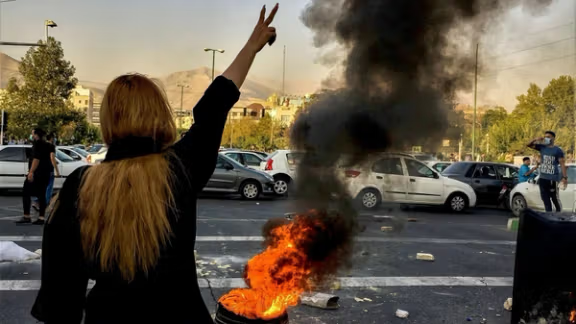
The Franco-German Prize for Human Rights and the Rule of Law 2022 has been awarded to Mahsa Amini and the people of Iran for their courageous fight for freedom.
Since 2016, France and Germany have jointly honored personalities or organizations who have made outstanding contributions to human rights.
The award winners are NGOs, lawyers, journalists, or activists who defend “the inalienable rights of every human being.” The winners stand up for those whose voices would often not be heard including women, survivors of sexual violence, LGBTIQ+ people, prisoners, children, or migrant workers.
The foreign ministers of France and Germany on Saturday jointly awarded the prize dedicated to Mahsa Amini and people of Iran for standing up for human rights.
The 22-year-old Iranian woman Mahsa Amini was killed in mid-September in police custody for allegedly not wearing proper hijab. Her death resulted in the largest Iranian protests against regime.
“Today, we honor Mahsa Amini and the people of Iran for their courageous commitment with the Franco-German Prize for Human Rights…with our French friends, we stand firmly by the side of these courageous men and women,” said German Foreign Minister Annalena Baerbock.
France’s Foreign Minister Catherine Colonna further stated that “France and Germany are determined to continue to accompany the men and women of Iran in their just struggle. You can count on Annalena Baerbock’s and my support. And we will continue our efforts to ensure the oppressors will not go unpunished.”